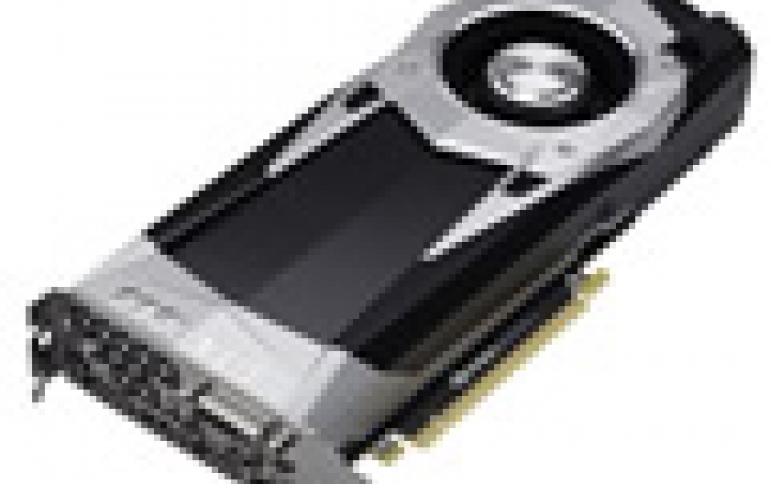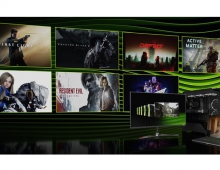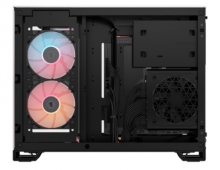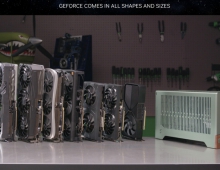
NVIDIA GeForce GTX 1060 Is Official, Starts at $249
Nvidia's response to the recently released AMD Radeon RX 480 graphics card is the new Radeon GTX 1060, which will retail starting from July 19th in two designs and two price points, starting at $249. Powered by TSMC?s 16nm FinFET process and the new GP106 GPU, the GTX 1060 will be NVIDIA?s play at the mainstream/enthusiast market.
The GTX 1060 and its GP106 GPU ships with 1280 CUDA cores, which is half the number found on GTX 1080/GP104. Similarly, this means we?re looking at half the texture units, and half of the polymorph geometry engines.
NVIDIA is giving GP106 a large 192-bit memory bus and 6GB GDDR5 clocked at 8Gbps. This means that the card has 192GB/sec of total memory bandwidth, an 71% increase over GTX 960.

Moving on to clockspeeds, the GTX 1060 will be shipping with a 1.7GHz boost clock. On an SM basis this puts GTX 1060 at 4.35 TFLOPs, giving the card 67% of the compute and geometry performance of the GTX 1070. Or to compare it to the outgoing GTX 960, we?re looking at an 80% increase in those same metrics.
NVIDIA is slotting GTX 1060 in the same TDP envelope as the outgoing GTX 960, which means 120W.
| GTX 1080 | GTX 1070 | GTX 1060 | GTX 960 | |
| CUDA Cores | 2560 | 1920 | 1280 | 1024 |
| Texture Units | 160 | 120 | 80 | 64 |
| ROPs | 64 | 64 | Unlnown, >64 | 32 |
| Core Clock | 1607MHz | 1506MHz | Unlnown | 1126MHz |
| Boost Clock | 1733MHz | 1683MHz | 1700MHz | 1178MHz |
| TFLOPs (FMA) | 8.9 TFLOPs | 6.5 TFLOPs | 4.4 TFLOPs | 2.4 TFLOPs |
| Memory Clock | 10Gbps GDDR5X | 8Gbps GDDR5 | 8Gbps GDDR5 | 7Gbps GDDR5 |
| Memory Bus Width | 256-bit | 256-bit | 192-bit | 128-bit |
| VRAM | 8GB | 8GB | 6GB | 2GB |
| TDP | 180W | 150W | 120W | 120W |
| GPU | GP104 | GP104 | GP106 | GM204 |
| Manufacturing Process | TSMC 16nm | TSMC 16nm | TSMC 16nm | TSMC 28nm |
| Launch Price | MSRP: $599 Founders $699 |
MSRP: $379 Founders $449 |
MSRP: $249 Founders $299 |
$199 |
In terms of performance, NVIDIA is targeting GTX 980 performance, but with a greater power efficiency - GTX 980 performance is coming down from 165W to 120W.
Officially the GTX 1060 starts at $249. At $299 NVIDIA is launching a Founders Edition card, which implements a full blower. NVIDIA?s partners won?t even be selling the GTX 1060FE; the card will only be available through NVIDIA?s website.

In terms of design, the GTX 1060 Founders Edition is aslightly smaller version of the common design shared by the GTX 1080 and GTX 1070 Founders Edition cards. The full care measures 9.75-inches long, 0.75-inches shorter than the GTX 1080/1070. Meanwhile the display I/O configuration is identical to the other Pascal cards at 3 DP 1.4 ports, 1 HDMI 2.0b port, and 1 DL-DVI-D port. Also, the SLI connector is absent from this board.
NVIIDA Ansel, Simultaneous Multi-Projection
NVIDIA is also today announced updates related to their technologies and related software projects.
Ansel, NVIDIA?s 360 degree high-resolution screenshot composition and capture technology, will be shipping in select games this month, with the first of those shipping today. The first two games to get Ansel-enabled will be DICE?s Mirror?s Edge: Catalyst and CD Projekt Red?s The Witcher 3. Ansel support for Mirror?s Edge is launching today, meanwhile The Witcher 3 will get support added later this month.
NVIDIA also announced that they have lined up both Unity and Epic Games to add support for the Simultaneous Multi-Projection technology to their respective Unity and Unreal Engine 4 game engines. Nvidia says that more than 30 games are now in development to implement the technology, including Epic?s Unreal Tournament.
NVIDIA is also announcing that their tech demo for Pascal, VR Funhouse, will be shipping this month. Unveiled alongside Ansel and SMP at the Pascal launch, VR Funhouse is built on Unreal Engine 4 and is meant to serve as a testbed for NVIDIA?s latest GameWorks/VRWorks technologies, including SMP and VRWorks Audio. The tech demo will be released on Steam later this month and will support the GTX 1060 and above. It will require a VR headset in order to use it.
NVIDIA has also confirmed that the source code to VR Funhouse will be opened up to developers.





















